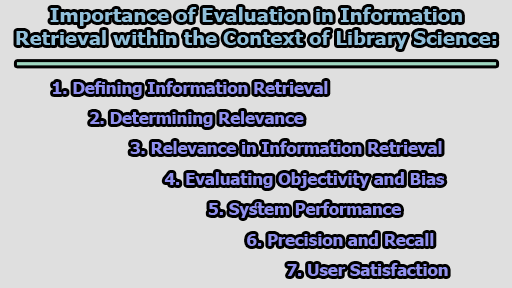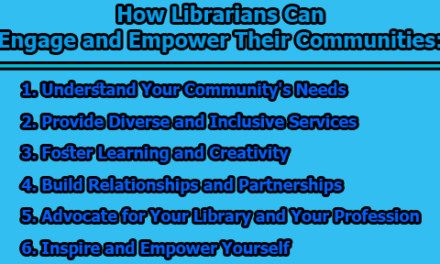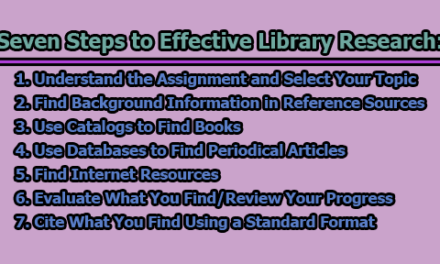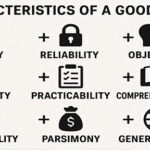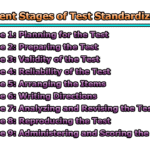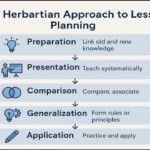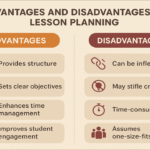Importance of Evaluation in Information Retrieval within the Context of Library Science:
In the world of library science, where knowledge and information are at the heart of everything, the process of information retrieval is of paramount importance. It is the key to accessing, managing, and delivering information to those who seek it. However, this process is not as simple as it may seem. It involves much more than just finding information; it also entails evaluating the information’s quality, relevance, and reliability. In this article, we will explore the importance of evaluation in information retrieval within the context of library science.
1. Defining Information Retrieval: Before delving into the significance of evaluation, let’s first understand what information retrieval is all about in the realm of library science. Information retrieval is the systematic process of seeking, locating, and retrieving specific information from a vast array of stored data. Whether you are searching through the digital archives of a library or scanning the pages of a physical book, information retrieval is at play.
2. Determining Relevance: One of the primary reasons why evaluation is indispensable in information retrieval is the subjective nature of relevance. In the world of research, the ability to discern the relevance of information is crucial. What is considered “good” information can vary greatly from one researcher to another. Hence, it is essential to have a structured approach to evaluating the relevance of the information retrieved.
This structured approach often involves creating a set of criteria or questions to assess the information against. Is the information in line with the research needs? Does it provide a comprehensive view of the topic? Is it reliable, up-to-date, and authoritative? These are some of the questions that librarians and researchers ask when evaluating the information they come across.
3. Relevance in Information Retrieval: In the context of information retrieval, the concept of relevance takes center stage. It’s not just about whether the information contains the right keywords but whether it genuinely addresses the user’s information need. This is particularly challenging when a user’s need is not explicitly stated. Imagine a user typing “python” into a web search engine – do they want to buy a pet python, or are they looking for information on the programming language Python? To evaluate relevance effectively, one must consider the context and intent behind the search.
4. Evaluating Objectivity and Bias: Another crucial role of evaluation in information retrieval is assessing the objectivity and bias of the information. In an age where information can be readily manipulated or skewed to influence individuals, librarians and information professionals have the responsibility to screen for propaganda and biased content. Propaganda, often defined as the systematic promotion of a particular idea, can be found not only in print but also in mass media and increasingly on the internet. Understanding and identifying propaganda techniques, such as the bandwagon effect, testimonials, and the use of emotional words, is a part of the evaluation process.
5. System Performance: Information retrieval is not just about the content; it also involves the systems and tools used to access that content. Therefore, evaluation is necessary to determine how well these systems work. This evaluation can encompass various aspects, such as processing speed, search effectiveness, and user satisfaction.
Effective information retrieval systems efficiently search through vast databases, returning a ranked list of responses that match the user’s query. A better search strategy yields a higher-quality ranked list, which, in turn, helps users find the information they need. This is why evaluation is crucial in comparing different systems and identifying those that provide better-ranked lists.
6. Precision and Recall: Precision and recall are key metrics in information retrieval. Precision measures the fraction of retrieved documents that are relevant, while recall measures the fraction of relevant documents retrieved. These metrics are used to evaluate the effectiveness of information retrieval systems.
There is often a trade-off between precision and recall – as one increases, the other may decrease. Evaluating these metrics helps to strike a balance, ensuring that the system can retrieve relevant documents while minimizing irrelevant ones.
7. User Satisfaction: At the heart of library science is user satisfaction. Evaluation is an essential tool in ensuring that information retrieval systems and processes meet the needs and expectations of users. User satisfaction is influenced by various factors, including system effectiveness, user effectiveness, user effort, and user characteristics.
System effectiveness is evaluated by how well the system achieves its objective. Traditionally, it is measured in terms of precision and recall, reflecting the system’s ability to retrieve relevant information and exclude irrelevant data.
User effectiveness, on the other hand, assesses the accuracy and completeness with which users achieve their goals. This can be measured by factors such as the number of tasks successfully completed, the number of relevant documents obtained, and the time taken by users to complete tasks.
In conclusion, in the field of library science, evaluation is not just a nice-to-have; it is a fundamental component of information retrieval. It serves as the gatekeeper of relevance, guarding against biased information and propaganda. Evaluation ensures that information retrieval systems perform optimally and meet the satisfaction of users.
Ultimately, the importance of evaluation in information retrieval cannot be understated. It is the bridge between the vast sea of data and the knowledge-seeker, providing assurance that the information obtained is of quality, relevance, and objectivity. In the ever-expanding world of digital information, the art of evaluation is a crucial skill for librarians and information professionals, ensuring that users find the treasure they seek amidst the vast ocean of data.

Assistant Teacher at Zinzira Pir Mohammad Pilot School and College

